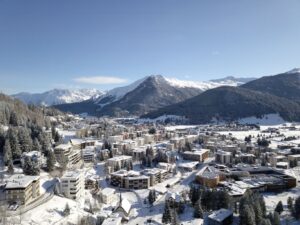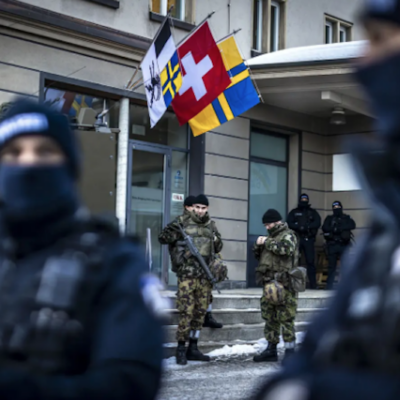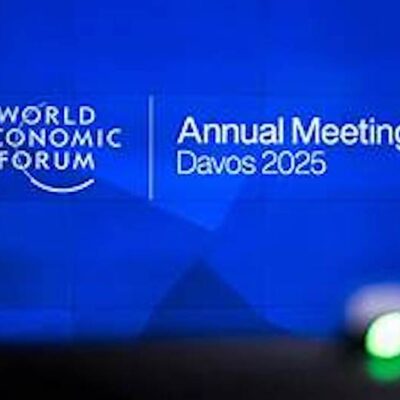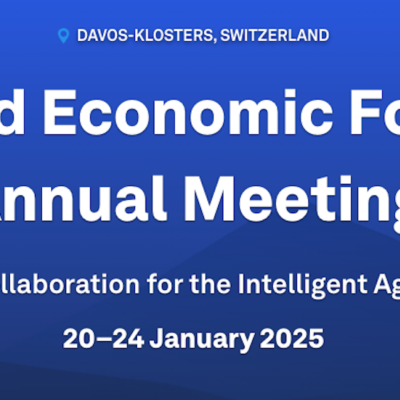The World Economic Forum (WEF) in Davos
The WEF in Davos is an annual meeting where global leaders, business executives, academics, and influencers gather to discuss and tackle the world’s most pressing issues. Founded in 1971 by Swiss economist Klaus Schwab, the WEF is a non-governmental organization with a mission to improve the state of the world through public-private cooperation.
Held in the picturesque alpine town of Davos, Switzerland, the forum is famous for bringing together an eclectic mix of participants—from heads of state to CEOs of multinational corporations, activists, and celebrities. The snowy setting contrasts sharply with the serious, often complex topics discussed, which range from climate change and global inequality to technological innovation and geopolitical tensions.
Key Features of the WEF:
- Global Agenda:
The WEF provides a platform to address challenges that transcend borders. It focuses on economic development, sustainable practices, and fostering international collaboration. - Davos Manifesto:
This set of principles, first introduced in 1973 and updated in 2020, outlines ethical business practices. It emphasizes that companies should serve all stakeholders—not just shareholders—promoting a fairer, more sustainable global economy. - Panels and Networking:
The WEF hosts panels and discussions where experts debate solutions to major global issues. For attendees, it’s also a prime networking opportunity, making it one of the most influential gatherings in the world. - Criticism and Controversy:
While highly regarded for its ambition, the WEF has been criticized for being elitist and out of touch with grassroots challenges. Some argue that the forum generates more talk than tangible outcomes. However, others defend its role in shaping global policies and fostering innovation. - Access and Exclusivity:
Participation at Davos is by invitation only, with high attendance costs. This exclusivity is often a point of contention but also part of its allure. - From climate action commitments to groundbreaking partnerships, the WEF has played a role in catalyzing key global initiatives. While opinions about its effectiveness vary, there’s no denying its influence in shaping the global agenda.
The History and Attendance of the World Economic Forum (WEF)
A Brief History of the WEF
The World Economic Forum began in 1971 as the brainchild of Klaus Schwab, a Swiss-German economist and professor. Originally called the “European Management Forum,” it aimed to introduce American management practices to European businesses. The first gathering brought together 444 business leaders from over 30 countries in the charming alpine town of Davos, Switzerland.
By 1987, the forum had broadened its scope to address global political, economic, and social issues, prompting the rebranding to the “World Economic Forum.” The organization is a not-for-profit foundation headquartered in Geneva, Switzerland. Schwab’s vision was to create a space where public and private sectors could collaborate to address global challenges—a mission that continues to define the WEF today.
The WEF has played a pivotal role in shaping world events. For instance:
- In 1988, Greece and Turkey signed a declaration of peace at the forum.
- In 1992, South African President F.W. de Klerk, Nelson Mandela, and Chief Mangosuthu Buthelezi attended to discuss South Africa’s transition from apartheid.
- The WEF has facilitated dialogues on climate change, globalization, and the digital revolution.
Over the years, the forum has expanded its activities beyond Davos, organizing regional meetings and publishing influential reports like the Global Risks Report and the Global Competitiveness Report.
Attendance at Davos
The WEF’s annual meeting in Davos is renowned for its exclusivity and the diverse mix of participants it attracts. Attendance is by invitation only, with delegates typically representing four key groups:
- Political Leaders:
Heads of state, ministers, and policymakers attend to discuss international relations, trade, and governance. Leaders like Angela Merkel, Xi Jinping, and Emmanuel Macron have all made notable appearances. - Business Titans:
CEOs and executives from Fortune 500 companies flock to Davos to network and shape the conversation on global markets. Firms like Microsoft, Goldman Sachs, and Google are often represented. - Academics and Experts:
Nobel laureates, economists, and industry specialists share insights on technology, health, and sustainable development. - NGOs and Civil Society Leaders:
Activists and representatives of organizations like Greenpeace and Oxfam join the dialogue to advocate for social and environmental issues. - Cultural Icons:
Influential figures from arts and media—such as Matt Damon, Bono, and Greta Thunberg—attend to amplify key messages and inspire action.
Village of Davos
Why is Davos the Venue?
The small ski resort town of Davos offers a unique setting, combining isolation with exclusivity. Its high-altitude charm fosters a sense of retreat and focus, enabling intense discussions away from daily distractions. Logistically, Davos provides top-notch conference facilities, though its size means participants often struggle with accommodation shortages—many opt for nearby towns or even Zurich.
Costs of Attending
Participation isn’t cheap. Membership fees for companies can range from $60,000 to over $600,000, depending on their level of involvement. This cost covers access to the forum, while individual attendees may still pay thousands for travel, accommodation, and security.
Despite its high price tag, the WEF’s unique platform for collaboration ensures that the guest list remains as exclusive as it is influential.



No comments:
Post a Comment